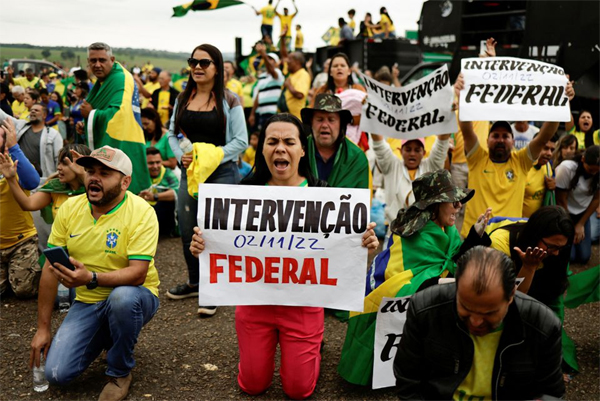
Tens of thousands of Brazilians demonstrated yesterday around the country demanding a military intervention. The protesters reject former president Luiz Inácio Lula da Silva’s victory in Sunday’s presidential elections, and called either for a military audit of results or an outright coup. Military leaders said an intervention is out of the question.
Brazilian President Jair Bolsonaro urged supporters to lift blockades they set up around the country in protest of his loss, a day after Bolsonaro agreed to start the transition of power to Lula, but without conceding victory or recognizing the validity of the elections.
Bolsonaro supporters started setting up roadblocks on Sunday, affecting mobility and cargo around the country. But blockades were fizzling today — protesters were blocking highways partially or fully in 76 locations. (See yesterday’s post.)
Yesterday Bolsonaro said he understood people’s frustration at the result of the election, but that blocking roads make the ongoing protests illegitimate. “Everyone is suffering from the closed roads. I ask you to clear the roads and protest elsewhere,” Bolsonaro said.
The first formal transition meetings between Bolsonaro’s team and Lula’s are set for today.
(Reuters, Reuters, Washington Post, New York Times)
More Brazil
- Brazilian authorities say they are investigating video of one of yesterday’s pro-coup rallies in which people are seen performing a “Nazi salute” as the Brazilian national anthem plays. (CNN)
- Groups of Brazilian football fans (torcidas organizadas) became unexpected champions of democracy, breaking up blockades in an effort to reach matches. (Guardian)
- “The Presidency looms again for Lula and, with it, an enormous amount of work to fulfill the campaign pledges he made,” writes Jon Lee Anderson in the New Yorker. “In addition to reunifying a divided nation and solving hunger, they include rescuing the economy, eliminating homelessness, restoring Brazil’s name on the world stage—and easing global climate change by saving the Amazon rain forest.”
Venezuela
- Venezuela’s Maduro government will resume talks with the country’s opposition parties in Mexico. Negotiations focused on conditions for a presidential election could start this month, after a year-long hiatus, reports Reuters.
Regional Relations
- Harsh U.S. sanctions against Venezuela have failed to bring about regime change. Instead they “helped cripple the country’s economy and fuel one of the largest peacetime migration exoduses in recent history,” writes Francisco Rodríguez in Foreign Policy, arguing the sanctions and the Biden administration’s new asylum policy have only worsened Venezuela’s humanitarian crisis.
- Eighteen former Latin American and Caribbean leaders have signed a letter to U.S. President Joe Biden asking the United States to remove its six-decade embargo on Cuba in the wake of devastation inflicted on the island by Hurricane Ian, reports the Associated Press. The letter also asks the U.S. to remove Cuba from its list of state sponsors of terrorism.
- Guatemalan officials in 2018 circled the U.S. Embassy in U.S.-sourced military jeeps in an operation interpreted by American diplomats as an “act of intimidation,” according to a new U.S. Government Accountability Office report. (The Hill, see post for Sept. 3, 2018.)
Ecuador
- Ecuador’s government deployed military troops to patrol the cities of Guayaquil and Duran, after a wave of organized crime violence killed six people on Tuesday. (AFP)
Mexico
- Two Mexican cartels are reportedly negotiating a peace agreement with the government, in which the criminal organizations would be permitted to pursue legal activities in exchange for giving up illicit businesses. The López Obrador administration denied such talks, reports Vice.
- Mexico City Mayor Claudia Sheinbaum is an early front-runner to be Morena’s presidential candidate in 2024. That could make the physicist and environmentalist Mexico’s first female president, reports Reuters.
Jordana Timerman / Latin America Daily Briefing
http://latinamericadailybriefing.blogspot











